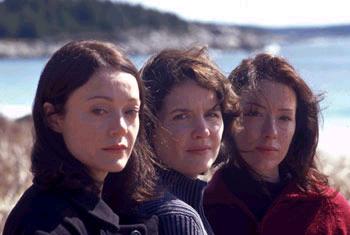“I thought you quit smoking.”
“I quit a lot.”
So says Agnes (Molly Parker) to her older sister Theresa (Rebecca Jenkins). Agnes is a chain-smoker, an alcoholic, a junkie, an all-around bad girl. Worse, she left Nova Scotia years ago to go live in Toronto! She’s now back home to assist their dying mother (Marguerite McNeil) and Theresa expects trouble. She’s also moved back into the old family house since her husband left her, which might explain why she’s so bitter and resentful. And then there’s Louise (Stacy Smith), the other sister, also living with Mom, apparently not doing anything with her life but watch hockey on TV.
So everyone’s messed up, basically. You wonder what big painful memory they’re gonna come up with to explain these women’s inner turmoil, but once they drop hints about “hiding from Dad” and Agnes starts stalking a mysterious 15 year old girl (Ellen Page), it’s not too hard to guess where this is going. This is classic melodrama material, which can still work when approached from an original viewpoint but not so much in such a conventional production. This is a desperately Canadian picture, where even horrible secrets and self-destructive behaviour seem a little too polite and harmless. Early on everyone acts like they hate each other, you sense a total lack of trust and even respect, but that’s soon softened into mere annoyances and bickering between siblings and you just know that everything will be just peachy by the third act.
What keeps the film somewhat engaging is the conviction of the actresses. The script might be predictable, superficial and trite, needlessly hammering the same points and forgetting some of its own characters (the dying mother is little more than a plot device), but often enough the cast manages to hold your attention. Molly Parker is particularly compelling. From her first minutes on screen she conveys vulnerability and sorrow, and just from the way she carries herself you understand that this is a complex woman who’s been through a lot.
The film, adapted by Daniel MacIvor from his play and directed by Wiebke von Carolsfeld, takes its title from the lyrics of Allister MacGillvray’s “Out on the Mira”, an anthem celebrating the rural Nova Scotia community (“I’ll trade you ten of your cities for Marion Bridge and the pleasure it brings”). Initially the song is an ironic counterpoint to small-town boredom and depression, but gradually the film mirrors its schmaltzy sentimentality and by the last scene whatever ambiguity it had has pretty much vanished. “Marion Bridge” is not an awful movie, just a forgettable one. Molly Parker fans might still want to check it out, others can wait until its inevitable CBC airing.
”Marion Bridge” plays Cinéma du Parc June 6-19.

